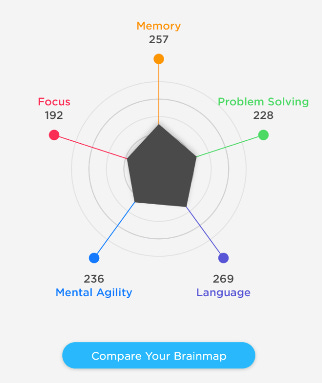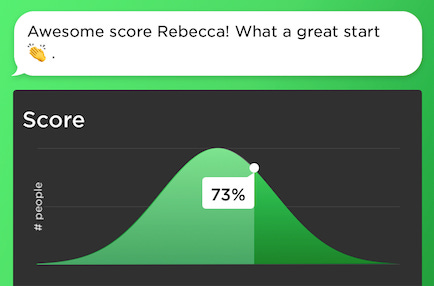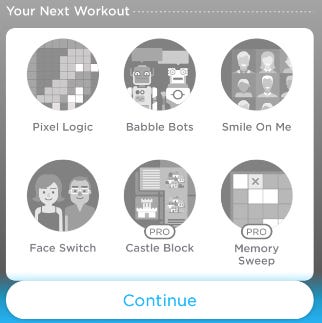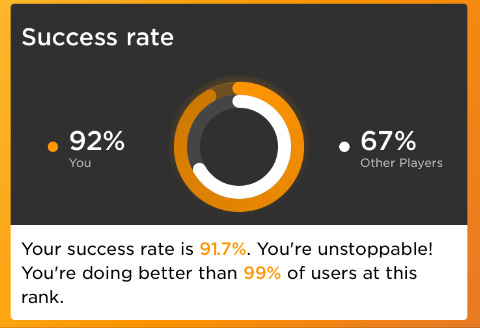Thinking About Getting Really Into: Brain Game Apps
Selena Gomez doesn't have Instagram on her phone anymore. She doesn't even know her password. But she does have Peak.
Peak, a "brain training" app, launched in 2014 and made the App Store's "Best of" list that same year. It's composed of games that aim to sharpen specific cognitive abilities: memory, focus, mental agility, language, and problem solving. A routine mental "workout" involve playing a handful of games (overall, taking no longer than five minutes) that can range from a Candy Crush-ified word search to a Connect-the-Dots-meets-Minesweeper memory tester. After this, you'll be presented with your Brain Map, which shows which cognitive skills you excel in, and which can benefit from a little more gaming.
I'm swept up by the possibilities of it all.

Over Labor Day weekend, I returned to my childhood bedroom in New Jersey, where I was met with the challenge of cleaning and reorganizing my bookshelf, which had long overflowed, teaming with random bits of literature that I had snagged from my local library's quarterly book sale. I was an ambitious teen, and when presented with the opportunity to grab armfuls of books for very, very little money, I went wild. For this reason, I discovered the 1985 book Venus Unbound unexplainably packaged with my collection of The Clique series (both of which promptly went into a donate pile, as I found them unmistakably outdated in their own respective ways). It is also the reason why I unearthed the 1982 book How to Be Twice as Smart: Boosting Your Brain Power.
I never read this book, nor do I have plans to do so, but now, as I await the push notification for my next Peak workout, I have to ask myself: am I falling for the illusion of quantifiable intelligence again?
Like many others, the vast majority of my life thus far has been spent in an academic setting, in which I felt a constant, pressing need to achieve specific grades, complete specific courses, and conquer specific tests—all to, yes, complete checkmarks in my school-to-career trajectory that I thought would be far more linear than it really is—but also to bring an much-desired image of myself to fruition. If I didn't get good grades, who was I?

Peak describes its mission as it relates to neuroplasticity: the concept that the brain changes over time, strengthening and weakening in certain cognitive functions as you age, use certain skills more than others, and generally go about your life. Brain training, like that found in Peak, helps to keep your cognitive functions up to speed. I know this science to be true. After all, there are plenty of studies that have shown that the type of training found in apps like Peak or Luminosity can improve the cognitive abilities of not just adults who suffer from dementia, but pretty much everyone.
Unlike back in high school, I now recognize the difference between cognitive function, learned knowledge, and critical thinking—but it's easy to fall for the idea that something so simple (say, an app or a book) can transform you into the intellectual behemoth you dream of becoming.
There's a longstanding myth (I'm sure you've heard it before) that people use only 10 percent of their brains. This concept loosely dates back to 1907, when psychologist William James wrote that humans made use of just a "small part" of their mental resources. Still, there is an allure to that idea. If only you could slowly, surely, increase your percentage of available brain power, gradually fueling up for that masterpiece you'll one day write or compose or paint or strategize into existence. What if it was all there in your mind, and you only had to excavate it?

Peak doesn't teach you anything new. It's not introducing new vocabulary in a foreign language, like Duolingo, and it doesn't encourage you to do some research of your own, like a tough question in a crossword might. It works with what you have, and over time, sharpens your memory, focus, problem-solving skills, and more. The brain is an organ. And it requires exercise—so I'm told—just as much as the heart does, though a different regime may be prescribed for each.
I spent a lot of time when I was younger bemoaning my mental talents, wishing that I could be like the brilliant national science-fair winners I saw on the news or the kids who had taught themselves five languages by the time they were 15. I wished it came easy, because it looked like it did for them. In reality, I didn't know if the time I spent training in ballet class or even playing The Sims was the time that they spent studying or learning something new. It's easy, sometimes, to write off mental achievements as the fruits of natural ability, when really, hard work comes in an wide array of forms: physical, emotional, mental, spiritual.
Peak tells users to "play smarter" and "feel sharper." It's meant to exercise your cognitive abilities—but that doesn't necessarily translate into what most of us interpret as "intelligence." An app can keep your brain sharp so it can more easily absorb and digest information, but it's not—I must admit—going to turn me into a polyglot or an expert of any given field. Now, I can accept that.

I spend a lot of time on my phone, going into rabbit holes that I justify as "research" or "inspiration-hunting." I still log on to Tumblr (hey, that's where some of the freshest memes are) and every Instagram notification draws me into a scrolling fest like a Pavlovian bell. But I also unplug plenty. With school behind me, I find myself reading more than I used to and actually sitting down to watch movies at home without checking Twitter throughout their duration.
As I write this, my next Peak workout is scheduled for 9 a.m., and I think I'm going to make it. After years of being so hard on myself, I think it's time that I give my brain a workout that won't lead to some test of skill or a final grade. It's served me well thus far, and even if a few memory games don't ease a magnum opus out of the depths of my cranium, that's fine. I'll be just as happy if I can better remember whether or not I actually blew out my candles before I left my apartment.


